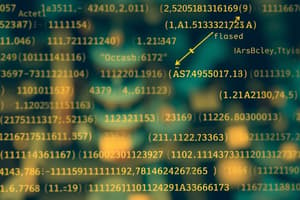Podcast
Questions and Answers
Which term is used to describe a finite sequence of rigorous instructions used to solve specific problems or perform computations?
Which term is used to describe a finite sequence of rigorous instructions used to solve specific problems or perform computations?
- Algorithm (correct)
- Heuristic
- Computation
- Inference
What are algorithms used for in calculations and data processing?
What are algorithms used for in calculations and data processing?
- Diverting code execution
- Automated reasoning
- Performing calculations (correct)
- Making inferences
Which term refers to an approach to problem solving that may not guarantee correct or optimal results?
Which term refers to an approach to problem solving that may not guarantee correct or optimal results?
- Algorithm
- Inference
- Heuristic (correct)
- Computation
What can more advanced algorithms do using conditionals?
What can more advanced algorithms do using conditionals?
Who used terms such as 'memory', 'search', and 'stimulus' as descriptors of machines?
Who used terms such as 'memory', 'search', and 'stimulus' as descriptors of machines?
Flashcards are hidden until you start studying
Study Notes
Algorithms and Problem-Solving
- An algorithm is a finite sequence of rigorous instructions used to solve specific problems or perform computations.
- Algorithms are used for calculations and data processing in various applications.
- A heuristic approach to problem-solving may not guarantee correct or optimal results, but can provide a good solution.
- More advanced algorithms can perform complex tasks using conditionals, which allow the algorithm to make decisions based on specific conditions.
- The terms 'memory', 'search', and 'stimulus' were used as descriptors of machines by Alan Turing, a pioneer in computer science.
Studying That Suits You
Use AI to generate personalized quizzes and flashcards to suit your learning preferences.




